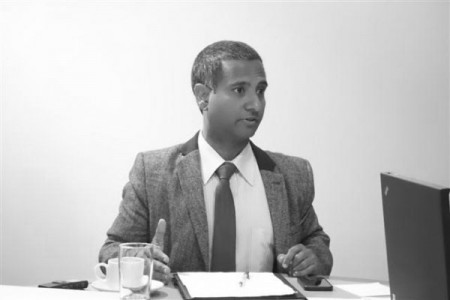Iran needs to be ‘named and shamed’ on rights violations

by Ranjit Bhaskar
The diaspora’s input is crucial in gathering information about alleged human rights violations in Iran as they are free to speak without intimidation, said the United Nations Special Rapporteur on the issue at the end of his fact-finding mission to the U.S. and Canada.
Ahmed Shaheed, a former foreign minister of the Maldives, said in Toronto that he interviewed 60 people in the two countries from July 14 to 28 and his findings have been consistent with the previous concerns raised by him about the situation in the Islamic republic.
Findings from around 500 interviews globally and other interactions with diaspora groups will be reflected in his report to the General Assembly in October, Shaheed said. “Initiative from the diaspora is essential to pressure Iran to change its ways by increasing awareness about violations.”
The UN official said naming and shaming countries on their human rights records is probably the only way correcting the situation as there are no enforcement mechanisms. “Iran sees itself as a leader of the South and is very sensitive to criticism. It cares and therein lays hope,” said Shaheed.
Canada being innovative
He said Canada‘s attempt at direct conversations with Iranians inside and outside Iran as part of its Global Dialogue program was innovative and the right way of bearing witness to Iran’s growing impunity and systematic disregard for human rights.
He said his talk with Foreign Affairs Minister John Baird in Ottawa was a meeting of minds with the same concerns.
On the question of current sanctions imposed on Iran, the Special Rapporteur called on the UN system and imposing countries to monitor the economic action to prevent potentially harmful impact on human rights.
The Special Rapporteur hoped that there will be new opportunities for dialogue with the new administration of President-elect Hasan Rohani. While not wildly optimistic of change as the president’s mandate will be circumscribed by Iran’s Guardian Council and a parliament full of conservatives, Shaheed said there is a window of opportunity. “Skepticism borne out of previous experience should not make us blind to opportunities.”
He reiterated his continued interest to visit Iran and expects a positive response this time around once Rohani takes office. Since his appointment in August 2011, Shaheed had made several requests to Iran for a country visit without success. No visit has been granted to any special procedure mandate-holder since 2005.
“This reluctance to open up makes Iran unique among nations, in the same league as North Korea,” he said. “Even the Saudi government receives human rights rapporteurs, whose visits are not just confined to countries in the South. The U.S. faces the most scrutiny with highest number of visits.”
Disconcerting reports
Reflecting on the last two years of his mandate, the Special Rapporteur spoke of frequent and disconcerting reports concerning punitive state action against various members of civil society; about actions that undermine the human rights by women, religious and ethnic minorities; and alarming reports of retributive state action against individuals suspected of communicating with the UN.
He was also alarmed by the rate of executions in the country, especially for crimes that do not meet serious crimes standards, and especially in the face of allegations of widespread and ongoing torture for the purposes of soliciting confessions from the accused.
“I have been able to gather a substantial amount of information from more around 500 interviews with Iranian residents and recent exiles. Their narratives portray a situation in which Iran continues to execute individuals for offenses not considered to be serious crimes under international law and in the absence of judicial safeguards,” Mr. Shaheed said.
Rampant executions
Last year, the Iranian government officially announced almost 300 executions. However, credible reports from family members, lawyers, human rights defenders and organizations estimated that 497 executions were implemented during 2012, and that 58 of these were public executions. These figures do not include disturbing accusations that some 500 additional secret executions.
The vast majority of these executions are related to drug-trafficking. Iran has argued that these acts are tantamount to the perpetration of violent crimes upon its populace and those of destination countries.
Iran also regards adultery, rape, blasphemy, alcohol consumption, and some economic crimes as capital offenses. Crimes against national security, as defined by the Iranian Government, also carry the death penalty. These crimes almost invariably involve a charge of Moharabeh, which has no direct translation but implies a trespass against God, and/or Mofsed-fil-Arz, which is loosely translated as “corruption on earth,” Shaheed said.
The Special Rapporteur asserted that the highest standards of both rigor and consistency are applied at all times while recording evidence and testimonies submitted to him. Only allegations that are cross-verified and consistently leveled by various sources are presented, he said.
The UN official hopes Iran would address the issues raised by him and consider an immediate moratorium on the death penalty and the unconditional release of civil society actors and human rights defenders prosecuted for protected activities under national and international laws.
He also wanted Iran to address those laws that contravene its international obligation to eliminate all forms of discrimination in law and practice. These include those laws and policies that undermine gender equality and women’s rights, discriminate against religious and ethnic minorities, and members of the lesbian, gay, bisexual, and transgender community in the country. – New Canadian Media

